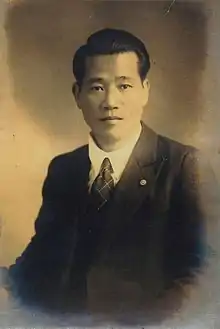Tang Te-chang
Tang Te-chang (Chinese: 湯德章; pinyin: Tāng Dézhāng; Wade–Giles: T'ang1 Tê2-Chang1; Pe̍h-ōe-jī: Thng Tek-chiong; 6 January 1907 – 13 March 1947), also known as Tokushō Sakai (坂井 德章, Sakai Tokushō), was a Taiwanese lawyer of Japanese descent, born in Tainan during Japanese rule. He was killed in the February 28 Incident.[1]
Tang Te-chang | |
|---|---|
 | |
| Born | 6 January 1907 Tapani Subprefecture, Tainan, Taiwan, Empire of Japan |
| Died | 13 March 1947 (aged 40) |
| Nationality | Empire of Japan Republic of China |
| Occupation | police officer, lawyer |
Life
Tang's parents Tokuzo Sakai and Tang Yu married in 1902. At the time, marriages between Japanese and Taiwanese were illegal, and Tang took his maternal surname. Tang's father was a police officer. He died when Tang was eight years old, as a result of attacks on police stations organized by supporters of Yu Ching-fang. The family was not compensated, and Tang grew up poor.[2] He received some financial help from a traditional Chinese physician named Yang Chuan.[3] He graduated from Tapani Elementary School, but dropped out of Tainan Normal School (now the National University of Tainan), and worked on his family's farm, and then later at a sugar refinery.[3] At that time, he enhanced his knowledge and fighting skills by learning Chinese language, Four Books and Five Classics, Chinese martial arts and Japanese martial arts.[3] In 1927, he passed the formal civil service examination and became a Tainan Prefecture Patrol officer deployed to Tōseki District (東石郡). He married a year later. Tang left law enforcement to pursue legal studies in Japan at the age of 32. He returned to Taiwan in 1943.[2]
February 28 Incident
Tang Te-chang was elected mayoral candidate by all Tainan senators, leaders of villages citizen organizations, and student representatives in 1947, when the February 28 Incident occurred.
After the 21st Division of National Revolutionary Army (NRA) descended on Tainan, about twenty gendarmes broke into Tang's house on 11 March 1947, to arrest him for the crime of rebellion. During his arrest, Tang burned a list containing the names of people on the Settlement Committee, an action regarded to have saved their lives.[4][5] Tang was interrogated by NRA soldiers regarding his ancestry, to which Tang reportedly replied, "I was born in Taiwan, I was raised in Taiwan. Am I not Taiwanese?" They insisted he was Japanese and Tang challenged them to question him in the Japanese language.[2] The next day, Tang was hung upside down, tortured and paraded. On 13 March, Tang was shot at Taishō Park (大正公園).[6]
References
- Wang, Chun-chung; Chung, Jake (23 February 2014). "Sun Yat-sen statue toppled". Taipei Times. p. 3.
- Han Cheung (10 May 2020). "Taiwan in Time: The martyr between two worlds". Taipei Times. Retrieved 9 May 2020.
- "正義與勇氣的紀念日 不該遺忘的混血俠士湯德章". 芋傳媒.
- Chung, Jake (26 Aug 2013). "Tainan delays relocation of statue of Sun Yat-sen". Taipei Times. p. 3. Retrieved 17 September 2016.
- "KMT condemns statue vandalism". Taipei Times. 24 February 2014. p. 3. Retrieved 17 September 2016.
- Huang, Wen-huang; Hsu, Stacy (24 January 2014). "FEATURE: Artist commemorates 228 to educate nation's youth". Taipei Times. p. 3. Retrieved 17 September 2016.
| Wikimedia Commons has media related to Tang Te-chang. |